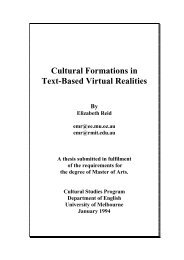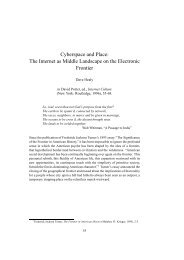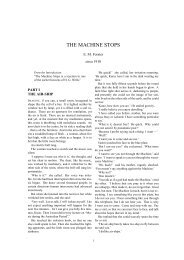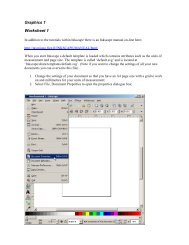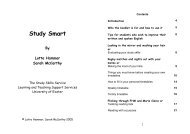PDF - The Metaphysics of Virtual Reality - University of Exeter
PDF - The Metaphysics of Virtual Reality - University of Exeter
PDF - The Metaphysics of Virtual Reality - University of Exeter
Create successful ePaper yourself
Turn your PDF publications into a flip-book with our unique Google optimized e-Paper software.
augment human bodily perception and create "virtual realities." 9 While we may legitimately<br />
inquire into the power wielded by computers independently <strong>of</strong> humans, the<br />
existential-ontological question really cuts in a different and deeper direction than does<br />
AI. As we now live and work with computers in our writing, building, banking, drawing,<br />
and so forth, how does our reality change? As Heidegger might put it: What is<br />
the meaning <strong>of</strong> this intimate connection <strong>of</strong> Being with computers? When he pondered<br />
technology as our destiny, Heidegger seemed to have had something in mind more intimidating<br />
than an external challenge to our dignity as human beings. What Heidegger<br />
saw was something even more sinister than a revolt <strong>of</strong> the machines.<br />
What Heidegger called "the essence <strong>of</strong> technology" infiltrates human existence<br />
more intimately than anything humans could create. <strong>The</strong> danger <strong>of</strong> technology lies<br />
in the transformation <strong>of</strong> the human being, by which human actions and aspirations<br />
are fundamentally distorted. Not that machines can run amok, or even that we might<br />
misunderstand ourselves through a faulty comparison with machines. Instead, technology<br />
enters the inmost recesses <strong>of</strong> human existence, transforming the way we know<br />
and think and will. Technology is, in essence, a mode <strong>of</strong> human existence, and we<br />
could not appreciate its mental infiltration until the computer became a major cultural<br />
phenomenon.<br />
Already in 1957 Heidegger noticed the drive for technological mastery pushing<br />
into the human interior where thought and reality meet in language. In his essay on<br />
Hebel, he wrote:<br />
<strong>The</strong> language machine regulates and adjusts in advance the mode <strong>of</strong> our<br />
possible usage <strong>of</strong> language through mechanical energies and functions.<br />
<strong>The</strong> language machine is—and above all, is still becoming—one way in<br />
which modern technology controls the mode and the world <strong>of</strong> language as<br />
such. Meanwhile, the impression is still maintained that man is the master<br />
<strong>of</strong> the language machine. But the truth <strong>of</strong> the matter might well be that the<br />
language machine takes language into its management and thus masters<br />
the essence <strong>of</strong> the human being. 10<br />
What did Heidegger mean when he referred to the "language machine" (Sprachmaschine)?<br />
He did not say "computer"—<br />
9 See Michael Benedikt, ed., Cyberspace: First Steps (Cambridge, Mass.: MIT Press, 1991). <strong>The</strong> term<br />
cyberspace originated with William Gibson, who uses science fiction to explore the symbiotic connection<br />
<strong>of</strong> humans and computers.<br />
10 Martin Heidegger, Hebel—Der Hausfreund (Pfullingen: Günther Neske, 1957); reprinted as<br />
"Hebel—Friend <strong>of</strong> the House," trans. Bruce Foltz and Michael Heim, in Contemporary German Philosophy,<br />
ed. Darrel E. Christensen (<strong>University</strong> Park: Pennsylvania State <strong>University</strong> Press, 1983), vol. 3,<br />
pp. 89-101.<br />
61



